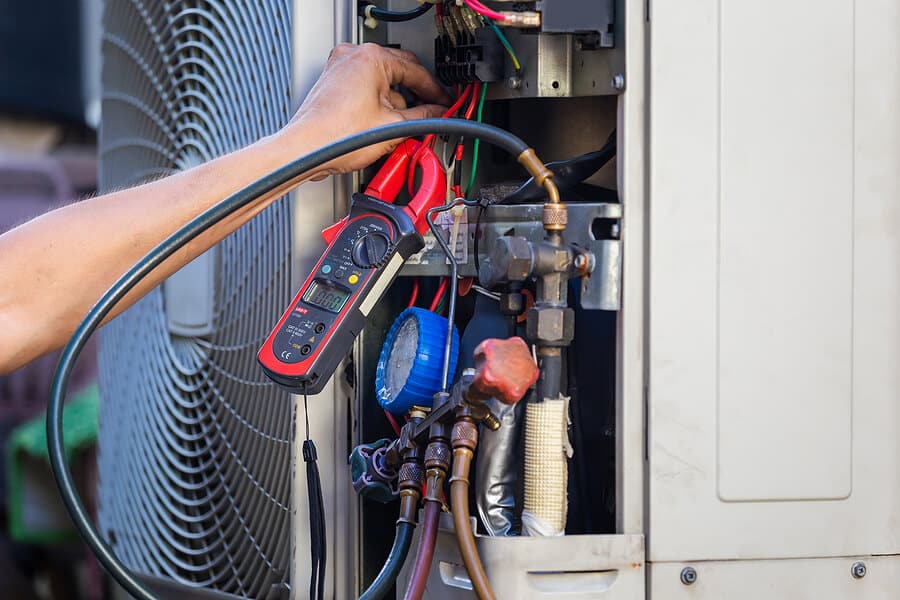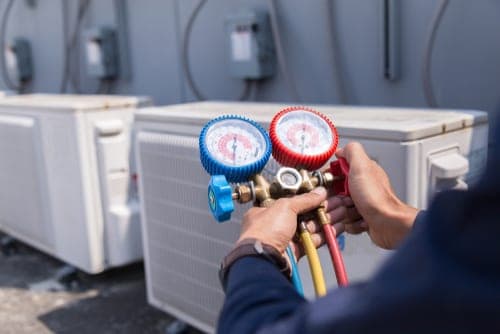Keep Your Home Cozy Year-Round with DMAKS HVAC Support.
Keep Your Home Cozy Year-Round with DMAKS HVAC Support.
Blog Article
Energy-Efficient Heating And Cooling Equipments to Reduce Energy Bills
As energy prices remain to climb, the significance of energy-efficient cooling and heating systems becomes progressively noticeable. These systems not just assure substantial cost savings on energy bills but also add to a much more sustainable future by lessening power consumption. With various options available, including geothermal warm pumps and ductless mini-splits, homeowner face a wide range of choices that can enhance comfort and air high quality. Understanding the crucial features and maintenance requirements is necessary to taking full advantage of these advantages. What variables should be prioritized when choosing the right system for your demands?
Benefits of Energy-Efficient Cooling And Heating Solutions
Energy-efficient Heating and cooling systems use countless benefits that expand past mere expense savings. By eating less power, these systems contribute to decrease greenhouse gas emissions, aiding to deal with environment change and promote sustainability.
Additionally, energy-efficient cooling and heating systems frequently supply improved convenience degrees. Most of these systems include sophisticated modern technology that enables much better temperature control and enhanced air high quality (DMAKS HVAC). This causes a much healthier interior environment, which is specifically important for individuals with allergic reactions or breathing concerns
Furthermore, buying energy-efficient heating and cooling systems can enhance residential property worth. As even more customers prioritize energy efficiency, homes and buildings outfitted with these systems may bring in greater quotes in the realty market.
Kinds Of Energy-Efficient A/c Options
Just how can house owners and businesses choose one of the most ideal energy-efficient heating and cooling choices for their demands? The market provides a selection of energy-efficient cooling and heating systems, each created to improve comfort while lessening energy consumption.
One option is the variable cooling agent flow (VRF) system, which efficiently manages the temperature level in multiple areas within a building. This system adjusts its cooling agent circulation to match the desired temperature level, causing significant power savings.
Another popular choice is geothermal heatpump, which make use of the earth's secure temperature to warm and amazing rooms. By moving warmth to and from the ground, these systems show excellent efficiency, especially in moderate climates.
In addition, ductless mini-split systems supply an energy-efficient alternative for homes doing not have ductwork. These systems permit for zone-specific heating & cooling, lowering energy waste in empty locations.
Last but not least, high-efficiency furnaces and air conditioners, with sophisticated SEER and AFUE scores, offer trusted environment control while eating much less energy than typical designs. By reviewing these alternatives, home owners and businesses can select a heating and cooling system customized to their particular needs and power efficiency goals.
Trick Features to Consider

Next, examine the sort of compressor made use of in the system. DMAKS HVAC. Variable-speed compressors can readjust their output to match the heating or cooling demand, bring about improved convenience and energy savings contrasted to single-speed versions. Furthermore, seek systems equipped with smart thermostats that provide programmable setups and remote gain access to, enabling far better control over energy consumption
An additional important feature is the system's air purification capability. High-efficiency filters can enhance interior air quality and reduce power consumption by guaranteeing the system runs effectively. Additionally, take into consideration the kind of refrigerant made use of; contemporary systems Visit Website usually employ green cooling agents that have a lower ecological effect.
Lastly, ensure that the system is compatible with zoning technology, which enables personalized temperature level control in different areas of your home, enhancing convenience while minimizing energy usage.
Tips for Choosing the Right System


Following, consider energy efficiency rankings, specifically the Seasonal Energy Performance Ratio (SEER) for cooling systems and the Annual Gas Application Efficiency (AFUE) for home heating systems. Greater rankings indicate greater effectiveness, which can cause significant cost savings on utility costs over time.
Additionally, assess the sort of HVAC system that finest matches your lifestyle and spending plan. Alternatives consist of central air conditioning, ductless mini-splits, and heatpump, each with its own collection of advantages and disadvantages.
Do not ignore the importance of appropriate setup and sizing; an inaccurately sized system can bring about inefficiencies and increased wear. Seek advice from with a professional A/c contractor to get skilled recommendations customized to your home's distinct requirements. This thorough strategy will make certain that you choose an energy-efficient heating and cooling system that meets your requirements and spending plan effectively.
Upkeep for Optimum Effectiveness
When the right a/c system is in location, continuous maintenance ends up being vital to making certain optimal performance and long life. A well-maintained system runs better, resulting in reduced energy consumption and decreased energy costs. Regular assessments and tune-ups ought to be scheduled at least two times a year-- as soon as before the air conditioning period and when prior to the heating period.

Property owners need to additionally be watchful about monitoring their cooling and heating system's performance. Uncommon sounds, varying temperatures, or boosted power bills can show underlying problems that call for prompt interest. By attending to these issues quickly, homeowners can stop costly repair work and prolong the lifespan of their systems.
Purchasing a maintenance plan with a qualified service technician not just improves effectiveness yet likewise offers peace of mind, understanding that the system is running at its his explanation best. DMAKS HVAC. Normal upkeep is therefore vital for sustaining power performance and decreasing total operational expenses
Final Thought
In verdict, energy-efficient cooling and heating systems provide a feasible remedy for minimizing utility bills while enhancing comfort and air top quality. By incorporating innovative innovations and alternatives such as geothermal heatpump and ductless mini-splits, building owners can attain significant energy cost savings and add to ecological sustainability. Careful consideration of system features and recurring upkeep further guarantees ideal visit this site performance, making energy-efficient systems a prudent investment for both financial and environmental benefits.
Report this page